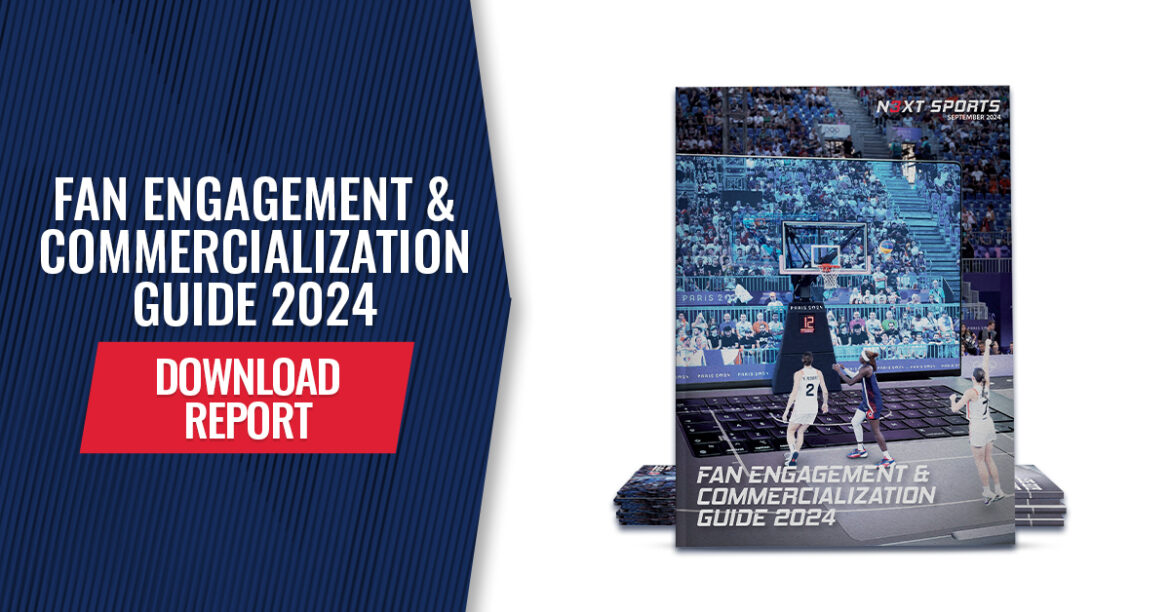Insights from Motasem El Bawab

There are many avenues which automation and artificial intelligence (AI) are able to serve a sports organization. Traditionally, AI in sports is associated with athlete-performance analytics and the creation of generative video production in which machine learning is helping rights holders distribute tailored content to their fans. These include the generation of athlete-specific content, or automated highlights from specific game plays, while also helping to segment the distribution of video content based on the user’s interests and geolocation.
The biggest change in the use of AI will be how it supports the governance of user data, including the role of machine learning to leverage operational efficiencies and their cost-saving benefits. Outlined in our recently published Fan Engagement & Commercialization Guide 2024, AI and assistive technologies are helping rights holders to personalize their fan and stakeholder experiences, as well as to optimize their internal workflows so as to increase productivity and efficiency drives that save on their bottom line and maximize fan value.
Across the sector at large, AI is playing a more established role in everyday user-data management, including information analysis and retrieval, while helping to reduce time and spend on cleaning duplicate and siloed data. This extends to how knowledge is shared between departments and offices, the cleaning and discovery of fan, athlete, and stakeholder data, and optimizing the organization’s overall customer relationship management (CRM).
Highlighting how AI is evolving in the sports industry, Motasem El Bawab, Chief Information Officer (CIO) at N3XT Sports, says: “AI is increasingly being adopted across various sectors of the sports industry, with its most recent applications aimed at improving how organizations process and manage the enormous amounts of data they handle on a daily basis. Early reservations about AI were primarily due to concerns over the accuracy of AI-generated insights and the potential for data misinterpretation.”
However, despite AI’s potential, its adoption remains limited, with organizations citing a lack of action around the implementation of AI solutions. A recent survey published by Microsoft shows that, while 79 percent of business leaders agree that their company needs to adopt AI to stay competitive, 60 percent worry that their organization’s leadership lacks a plan and vision to implement AI. In order for AI to play an effective role in sport’s commercial growth, it’s first essential for business leaders to understand its unique use cases inside their organization.
CHANGE MANAGEMENT | EDUCATION KEY TO EMPOWERING AI GOVERNANCE
Across different industries, AI and machine learning solutions demonstrate significant opportunities to unlock employee productivity and creativity, and are driving more value across various organizational functions. According to Microsoft’s findings, there are several key areas where AI is already having an impact on business productivity:
- Meetings: 84 percent of employees found it easier to take action after a meeting with AI support.
- Emails: 64 percent reported spending less time processing emails.
- Finding information: 75 percent saved time locating the information they needed.
- Writing: 85 percent said AI helped them quickly generate a strong first draft.
In order for sports organizations to generate value through operational optimization, assessing and then addressing how their digital frameworks serve dataflow and its cost to the overall business are critical. By automating data-management processes, AI helps streamline the flow of information and enhances knowledge sharing across sports organizations and federations.
Nevertheless, how to implement AI solutions into an organization can be challenging. Microsoft research shows that 41 percent of business leaders expect to redesign their business processes with the use of AI in the next five years and highlight AI training and governance as key areas in their transformation.
“Sports properties should focus on investing in robust data analytics infrastructure and AI training programs to stay ahead,” Mota advises. “By harnessing machine learning models, clubs can uncover deep insights, while sports organizations and rights holders that effectively integrate AI technology can become more attractive to investors.
“N3XT Sports provides training and awareness programs for its clients to help them explore how AI and machine learning can be implemented into their business processes. This includes challenges surrounding AI adoption and governance, helping our clients better understand how to customize AI solutions to their business needs and steps to building a tailored AI strategy.”
SOLUTION | N3XTAI
Our proprietary solution N3XTAI helps sports properties scale new data analytics infrastructures and makes data easier to find. Our clients benefit from N3XTAI through specific use cases that optimize their operations.
These include the ability to query the data directly with the support of an assistive AI and unlock greater insights into online fan behavior. It also allows for optimizations within internal chat functions, document retrieval and analysis, the automation of meeting minutes, quarterly reporting, contract renewals, among many others.
N3XTAI, as a service, will:
- Explore ways AI adoption can best serve the sports organization
- Implement applications that speed up the review of internal documentation
- Make it quicker and easier to search for internal data and information
- Allow personnel to query the data directly within a secure application
- Ensure absolute reliability of the data and information AI generates

“As the sector continues to evolve and the focus moves towards data ownership, AI is providing new opportunities for sports properties to commodify its fan and athlete data, deepening its understanding of its customers and stakeholders, and making their brand more appealing to investors,” Mota explains. “AI can streamline operations, from ticket sales to facility management.
“For example, AI-driven tools can optimize pricing strategies for tickets based on demand predictions, enhancing revenue potential. Not to mention the additional automation that can be used for customer service on matchdays. AI can also manage logistics at sports venues, including crowd management and maintenance scheduling, making operations more cost-effective.”
WHAT’S N3XT?
Given the importance of fan, athlete, and stakeholder data to the sports industry, data optimization is key for organizations to reduce the cost of storing duplicate and redundant datasets. Data consolidation is therefore a crucial step for sports properties to take during their digitization of internal workflows.
While AI is driving efficiencies within the governance of technology and data inside sports properties, it’s essential for organizations to first understand which AI solutions are available to them, the use cases for AI adoption, and how they can best serve their workforce and wider business objectives.
“For example, better performance and more sophisticated management strategies can lead to increased ticket sales, higher merchandise sales, and improved broadcast rights deals,” Mota says. “All of these factors can significantly raise a sports club’s valuation by demonstrating potential for higher, more sustainable earnings. These clubs are seen as forward-thinking and better positioned for long-term success.”
Our team at N3XT Sports works tirelessly to develop and implement data and digital transformation strategies across a multitude of sports properties at federation level, competition level, and club level. To find out more about how N3XT Sports can serve your organization, fill out the form below, and we’ll be in touch. Our goal is to drive the digitalization of the sports industry and our clients.




